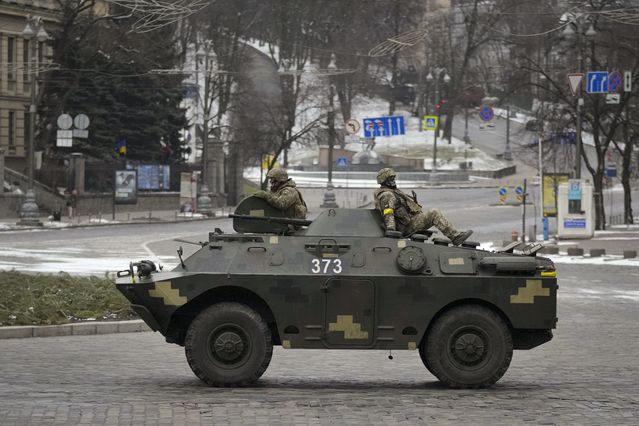KYIV, Ukraine—Russian forces resumed airstrikes on central Kharkiv, Ukraine’s second-largest city and continued pounding other cities as they sought to break the will of Ukraine’s resistance on the seventh day of the war unleashed by President Vladimir Putin.
Kharkiv’s police headquarters and the nearby university building were severely damaged and caught fire. There was no immediate word on casualties. Several residential areas of Kharkiv were hit overnight and Russian forces attempted to seize the city’s military hospital, local authorities said. However, the front line held and the city of 1.4 million people remained under Ukrainian control, they said.
The assault on civilian targets shows how Moscow has switched from its initial strategy of abstaining from indiscriminate killing to attacks that are more sweeping with the aim of demoralizing Ukraine’s defenders.
Russia’s Defense Ministry said Tuesday afternoon it would strike Ukrainian intelligence and communications facilities in central Kyiv that it said are being used for “information attacks” against Russia, and urged residents living nearby to leave for their own safety. Western diplomats took the warning as a signal that a massive strike on Kyiv’s residential areas was imminent. Some of the remaining staff at foreign embassies left Ukraine’s capital.
The warning was followed up by a strike on Kyiv’s television tower that killed five civilians and injured five others, Ukraine’s state emergency service said. It also temporarily disabled the broadcasting ability of Ukraine’s central TV channels, Ukraine’s communications authority said. The authority said it would switch on reserve broadcast facilities.
Read Also : Christians Begin lent with Ash Wednesday
The TV tower, erected in 1973, stands in the Babyn Yar area, where much of Kyiv’s Jewish population was massacred by the Nazis during World War II.
Mr. Putin has said his goal is to “de-Nazify” Ukraine, falsely claiming that Ukrainian President Volodymyr Zelensky, who is Jewish, is beholden to U.S.-guided neo-Nazis.
Live-cam footage from Freedom Square in Kharkiv showed a missile landing just outside the local government’s headquarters at 8:01 a.m. local time Tuesday, with a fireball charring nearby buildings and cars. Ukraine’s national emergency service said seven people were killed and 24 injured in the strike.
Later in the day, additional Russian airstrikes hit Kharkiv’s residential neighborhoods, killing more than 10 civilians, local authorities said.
The strike came amid signs that Russia’s military forces were pausing their advance on Kyiv, having encountered a range of obstacles since entering Ukraine. A senior U.S. defense official said the Russian advance has stalled amid food and fuel shortages, Ukrainian resistance and slower-than-expected troop movement toward Kyiv.
The Russians “are regrouping and trying to adjust to the challenges they have had,” the U.S. official said.
In an emotional video address to the European Parliament on Tuesday, Mr. Zelensky said Ukrainians were dying in a struggle for the country’s survival. “We are giving our lives for the right to be equal,” he said, unshaven and wearing a green army T-shirt. “Prove that you are with us and will not let us go.”
Read Also : FIFA, UEFA Expel Russia From All International Football Competitions
President Biden spoke with Mr. Zelensky for more than 30 minutes on Tuesday, the White House said. The two leaders discussed U.S. and allied assistance for Ukraine and Russia’s escalation of attacks on sites used by civilians, including the strike near Babyn Yar, the White House said.
Mr. Biden formally announced a ban on Russian aircraft from American airspace on Tuesday, broadening aviation restrictions as the West expands sanctions over the war in Ukraine.
“He thought he could roll into Ukraine and the world would roll over,” Mr. Biden said in his State of the Union address. “Instead he met with a wall of strength he never imagined. He met the Ukrainian people.”
Russia’s invasion of Ukraine—launched on Feb. 24 by Mr. Putin with the aim of overthrowing the country’s elected government and ending its alignment with the West—has made slower progress than most military analysts had expected. Russian forces are struggling with fierce Ukrainian resistance and logistical problems.
Russian troops appear to be “risk averse,” the U.S. official said, adding that there is evidence that some Russian forces have surrendered and that troop morale is weak. The U.S. official said no evidence has emerged that Russia is considering retreating from its aim of capturing Kyiv.
Russia has gained a swath of land in southern Ukraine, including capturing Kherson city, in addition to its push in the northeast and northwest.
Mr. Putin, who claims Russians and Ukrainians are the same people, initially abstained from the kind of indiscriminate shelling of civilian areas that Russia used to subjugate its rebellious province of Chechnya in 1999-2000. The new barrages indicate that this relative restraint is falling away as Moscow seeks to crush Ukrainian resistance.
Heavy fighting continued throughout Ukraine on Tuesday, with Russian forces advancing in the country’s south and trying to push into Kyiv.
A large column of Russian forces kept heading toward Kyiv from the northwest, U.S. officials said. Satellite imagery from Maxar Technologies showed a long convoy of vehicles snaking toward Russia’s forward positions. However, the front line in the battle for Kyiv remained stationary near the town of Bucha on Tuesday.
A first round of cease-fire talks between Russian and Ukrainian delegations meeting in Belarus on Monday produced no immediate results, and the two sides initially agreed to meet again in the coming days on the Ukrainian-Polish border.
Russia is facing growing international isolation and its financial system is reeling under the impact of Western sanctions imposed over the weekend.
The U.S. and the European Union said over the weekend they would hinder Russia’s central bank from using its foreign reserves and exclude a number of Russian banks from the international Swift payments network, among other measures.

